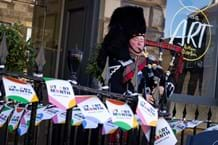In addition to its many decorative features – from pierced brass corners and iron repoussé lockplates and handles to marquetry panels of birds among stylized foliage – the 4ft 1in (1.24m) wide chest had an impeccable provenance.
The chest was probably a gift from the East India Company to Richard Starke (1720-1794), right, upon his retirement (or resignation) in 1756 from the position of 2nd in Council at Fort St George and Deputy Governor at Fort St David. He was replaced by Robert Clive, later to become Lord Clive of India. Richard Isaac Starke, his son, settled in Laugharne, Carmarthen, becoming a Colonel of the Carmarthen Militia and in 1809 High Sheriff of Carmarthen. The chest has been in the Starke family seat, Castle House, Laugharne, for almost 200 years. It was consigned for sale in South Wales after an inheritance dispute, with the property also coming onto the market.
In untouched condition with an £8000-£10,000 estimate, three bidders chased to £30,000 for the chest and two dealers prepared to see it to £49,500 (plus 15 per cent buyer’s premium). It was bought by London dealer Anthony Outred, who told the Antiques Trade Gazette: “It is the most exciting piece of Anglo-Indian furniture to come on the market for years, of great historical importance and an exceptional design for its period.”
New House Record for Peter Francis
Setting a new house record at Carmarthen auctioneers Peter Francis on March 9 was this 18th century Coromandel Coast marquetry inlaid padouk, ebony and ivory chest of five short and two long drawers.




